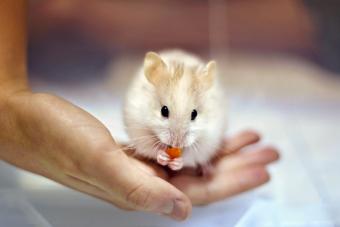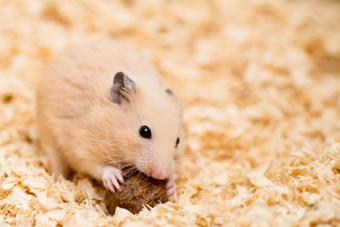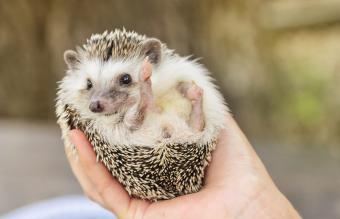
Hamsters are very popular pets, but sometimes they don't get the foods and treats they need to thrive. Understanding what hamsters can eat is essential to help them maintain optimal health. Hamsters need special diets in order to stay healthy, so make sure you give them the foods and treats they need to be well.
A Hamster's Proper Diet
Hamsters are omnivorous, which means they eat both plants and insects. Hamsters are not known to be picky eaters, either. They will eat almost anything edible that you give to them--including foods that aren't safe--if they are hungry enough. That's why you need to make sure anything that's provided is beneficial to your pet's health.
Your hamster's diet should be full of variety. Include the following in their bowl:
- Commercial hamster pellets: Pelleted diets are recommended over blends because hamsters cannot pick and choose what they like and leave what they don't like. Hamsters that have a favorite food in the mix may eat only that food and leave the remainder, resulting in nutritional deficiencies.
- A handful of Timothy hay: This provides a large amount of roughage, which hamsters require to keep their digestive system working properly. It also helps keep the hamster's teeth in good shape.
- Acceptable fruits and vegetables: The best fruits and veggies for your hamster are listed below.
- Occasional mealworms or half of a boiled egg for added protein
You should also provide constant access to clean, fresh water. If you notice the water bowl getting dirty, dump the water and clean their bowl, then refill. This may need to be done several times each day.
Fruits for Hamsters
Fruits such as apples, bananas, melons, and strawberries are great forms of treats for your pet because they provide them with dietary fiber, natural sugars, and vitamins which are essential for maintaining good health. They also provide nutrients like potassium, manganese, and vitamin C that help avoid various health issues, such as constipation or poor digestion.
You can give the fruits whole or chop them into pieces. Give your medium-sized hamster about ½ cup per day on an empty stomach after they've eaten their regular food. If you choose to chop up the fruit, then make sure there are no pits or seeds left behind, as these could be harmful if your pet ingests them.
The following fruits are good for hamsters, fed in moderation or as occasional treats:
- Bananas: Bananas contain high amounts of potassium, which helps prevent muscle cramps and weakness in your pet. They also help regulate blood pressure levels, so if your hamster has been stressed out lately, then this is a great treat for them! You can give them whole bananas, but be careful not to overfeed them, as they may cause digestive problems like diarrhea.
- Apples: Apples are good for hamsters because they contain a lot of fiber and vitamins B1, B2, and C. However, you should avoid giving them whole apples as they can cause digestive problems for your little friend. Cut the apple into small pieces before offering it to your pet.
- Blueberries: Blueberries contain antioxidants that help fight cancerous cells and boost your pet's immune system. They also contain vitamin C, which helps prevent infections in hamsters.
- Peaches: Peaches are OK for hamsters, in moderation, but never feed canned peaches or anything with added sugar.
- Melon: Various types of melon are good for hamsters, but again, don't cut them an entire wedge. They'll go crazy. Offer a very small portion of cut-up melon.
- Pears: Just like apples, pears are good for hamsters. Just make sure you slice them up and don't offer any seeds to your little guys.
Hamsters cannot eat oranges or other citrus, and they shouldn't eat any part of a tomato plant or onions. The acidic content of these foods is too much for your little guys - and some can be toxic to them.
Vegetables for Hamsters
Vegetables are another good choice for your hamster. Vegetables provide a variety of nutrients such as vitamin A, vitamin K, and antioxidants, which can prevent heart disease and boost immunity against disease-causing bacteria or viruses.

Recommended veggies for hamsters include:
- Carrots: Carrots contain beta-carotene, which gives them their orange color, and it also helps keep their eyes healthy by preventing tear stains on caused by allergies or infection. These nutrients make carrots an excellent choice for feeding your hamster.
- Cucumbers: Cucumbers contain a lot of water, which makes them ideal for keeping your hamster hydrated while providing a certain amount of carbohydrates at the same time. They also contain nutrients, such as vitamins B1, B2 and C as well as potassium, which help maintain normal blood pressure levels in your pet.
- Green beans: Green beans are high in fiber and packed with vitamins and minerals that are essential for proper development. You can serve raw or cooked green beans to your hamster as an occasional treat or as part of their regular diet if they like them.
- Zucchini: Zucchini has become very popular lately as an alternative to carrots because it's much easier to cut into small pieces, so if you have trouble cutting up carrots, then try using zucchini instead.
How Much to Feed
Hamsters need an average of 5 to 10 grams of food per day, with an additional 2 grams for each gram of body weight over 12 grams. For example, a 15-gram dwarf hamster needs about 10 to 15 grams of dry food per day, while a 20-gram Syrian needs about 12 to 18 grams.
Exact amounts vary from animal to animal because different species have different metabolisms. Some pets eat more than others without any ill effects. You can judge how much your pet eats based on their weight and activity level, but don't worry if they eat less than what's recommended as long as they appear happy and healthy.
Additional Tips for Feeding a Proper Diet
The following are added tips that can help you provide your pet with the best diet possible:

- Never give your hamster dried fruit, as it can cause diarrhea and constipation in some species, such as dwarf hamsters.
- Starchy foods like pasta or rice can also cause problems because they're high in carbohydrates but low in fiber.
- Make sure that you always check the labels on any food you buy for your hamster. Some foods may be toxic to them. And remember to keep any new food out of reach until you are sure that it won't cause digestive problems for your pet.
- Hamsters spend a lot of time chewing on things like wooden toys, so make sure the water bottle is secure enough, so it doesn't spill over when the hamster is chewing on it or playing with it.
- Nuts provide some protein for your hamster but also contain fat, so give those sparingly. Good choices include sweet almonds (but not bitter almonds), cashews, and peanuts.
Provide the Best Diet
As you can see, variety is key. Provide your hamster with a range of foods to ensure any nutritional gaps are filled in their diet. Providing the best possible diet will help your hamster lead a long, happy, and healthy life. Take note of the foods your hamster does like and what they don't and adjust accordingly. Don't forget to provide fresh water at all times to keep your pet hydrated and maintain their digestive health.







